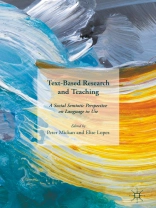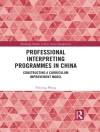Contributions in this book illustrate the many methods available for researching language in context and for the analysis of everyday text types. Each chapter highlights language as a resource for the expression of meanings—a social semiotic resource. Text analysis is used to reveal our capacity to formulate multiple meanings for participation in different social practices—in relationships, in work, in education and in leisure. The approach is applied in text-based teaching and in the critical analysis of public discourses. The texts come from different social spheres including banking, language classes, senate hearings, national tests and textbooks, and interior architecture. Text-based research makes a major contribution to Critical Discourse Analysis. The editors and authors of this book demonstrate the value of text analysis for awareness of the role of language for accountable citizenship and for teaching and learning. This book will be of interest to anyone researching in the fields of language learning and teaching, functional linguistics, multimodality, social semiotics, systemic functional linguistics, text-based teaching, and genre analysis, as well as literacy teachers and undergraduate and postgraduate students of linguistics, media and education.
Table des matières
– Chapter 1: Introduction: Text-Based Research and Teaching.- Part I: Text-Based Research in Everyday Social Settings.- Chapter 2: Text-Based Research and Teaching from a Social Semiotic Perspective: Transformative Research and Pedagogy.- Chapter 3: A Month of Climate Change in Australia: A Corpus-Driven Analysis of Media Discourse.- Chapter 4: A (Critical) Discourse Analysis of Alan Greenspan’s Public Discourses on the Housing Bubble: The Trigger to the Global Financial Crisis.- Chapter 5: A Social Semiotic Perspective of Multimodal Banking Discourse in the Context of the Global Financial Crisis.- Chapter 6: Locating Voices in Memoir: Modelling Voice through an Analysis of Interpersonal Linguistic Choices.- Chapter 7: The Generic Structure of the Call for Papers of Predatory Journals.- Part II: Text-Based Language Pedagogy.- Chapter 8: Students Questions in Talk around Children’s Picture Books.- Chapter 9: Text-Based Teaching in a High School Setting.- Chapter 10: A Socio-Semiotic Perspective on a Unit of Work in an Indonesian Textbook.- Chapter 11: The Text-Based Approach in the German as a Foreign Language Secondary Classroom: A Case Study.- Chapter 12: Spoken Texts in High-Stakes EFL Testing in Korea and their Impact on High School English Teaching.- Chapter 13: Text: A Means for Language Socialisation in Communities of Practice.- Chapter 14: Self-Learning a Foreign Language through Literature: A Case Study of a Self-Learner’s Socialisation into Czech through Czech Literature.- Chapter 15: Thematic Options and Success in ESL Writing.- Chapter 16: Using Student-Selected Texts in Speaking Classes.- Chapter 17: ‘Now We Are All Friends’: An Exploratory Study of Social Networking Texts in the Context of Second Language Learning.- Chapter 18: Academic Literacies in the Field of Interior Architecture: A Multimodal Analysis.- Chapter 19: Documentation, Renewal and Semiotic Mediation: Continuing Text-Based Research and Teaching.
A propos de l’auteur
Peter Mickan is Visiting Research Fellow in Adelaide University, Australia. His research interests include language learning and teaching, academic literacies, language testing and curriculum design from the perspective of language as a social semiotic. In
Language Curriculum Design and Socialisation (2013), Mickan applies systemic functional linguistics to curriculum design and languages pedagogy.
Elise Lopez is a Ph D Candidate in the Department of Linguistics at the University of Adelaide. Her dissertation research examines the place of memoir within the SFL framework and its role in shaping patterns of identity and memories of shared experiences.












